Net Neutrality Day of Action: what is it and what does it mean for you?
This could change the internet forever

Sign up for breaking news, reviews, opinion, top tech deals, and more.
You are now subscribed
Your newsletter sign-up was successful
The Federal Communications Commission (FCC) has proposed a major rollback of net neutrality laws, and in protest the public along with some of the biggest companies in the world are taking a stance during the Net Neutrality Day of Action.
The protests range in arguably how effective they are, but the point is the same: the rollback of net neutrality laws could seriously damage the internet as we know it.
Today's being called the Net Neutrality Day of Action, or Day of Action to Save Net Neutrality, and there are dozens of companies taking part, including Google, Facebook, Amazon and Reddit.
Why are these giants of the industry being so vocal about net neutrality? There are a few reasons. From a business perspective, limitations on what pages people can access could ultimately lead to fewer people viewing certain pages. For example, if you have to pay extra to access Facebook, fewer people will end up using Facebook, which is bad news for Facebook as well as users who would have to pay.
This is by far not the only reason companies are taking part, of course. Here’s a rundown of what net neutrality is, what the major tech companies are saying during the Day of Action, and why all this matters to you.
- On December 14, 2017, the US FCC (Federal Communications Commission) repealed net neutrality rules, sparking an outcry among startups, NGOs, but also the public in general, in the US or abroad. VPNs can actually allow you to get around Net Neutrality controls set by ISPs. Here is a list of the best VPN providers we've tested.
What is net neutrality?

To understand what the Net Neutrality Day of Action is all about, it’s important to know what net neutrality is in the first place.
The dictionary definition of net neutrality is: “the principle that internet service providers [ISPs] should enable access to all content and applications regardless of the source, and without favoring or blocking particular products or websites.”
Sign up for breaking news, reviews, opinion, top tech deals, and more.
Net neutrality is the idea that internet service - regardless of what’s being accessed or who’s accessing it - shouldn't be restricted. Without net neutrality rules in place, this unrestricted, open internet access is put in jeopardy.
What major tech companies are saying today
Here's a look at what some of the major tech companies are saying and doing today as part of the Net Neutrality Day of Action:

Facebook may not have done anything official today, but founder and CEO Mark Zuckerberg posted a note in support of net neutrality on his personal Facebook page.
“Right now, the FCC has rules in place to make sure the internet continues to be an open platform for everyone,” he writes. “At Facebook, we strongly support those rules. We’re also open to working with members of Congress and anyone else on laws to protect net neutrality.”
It’s a strong position from one of the tech industry’s most prominent leaders.
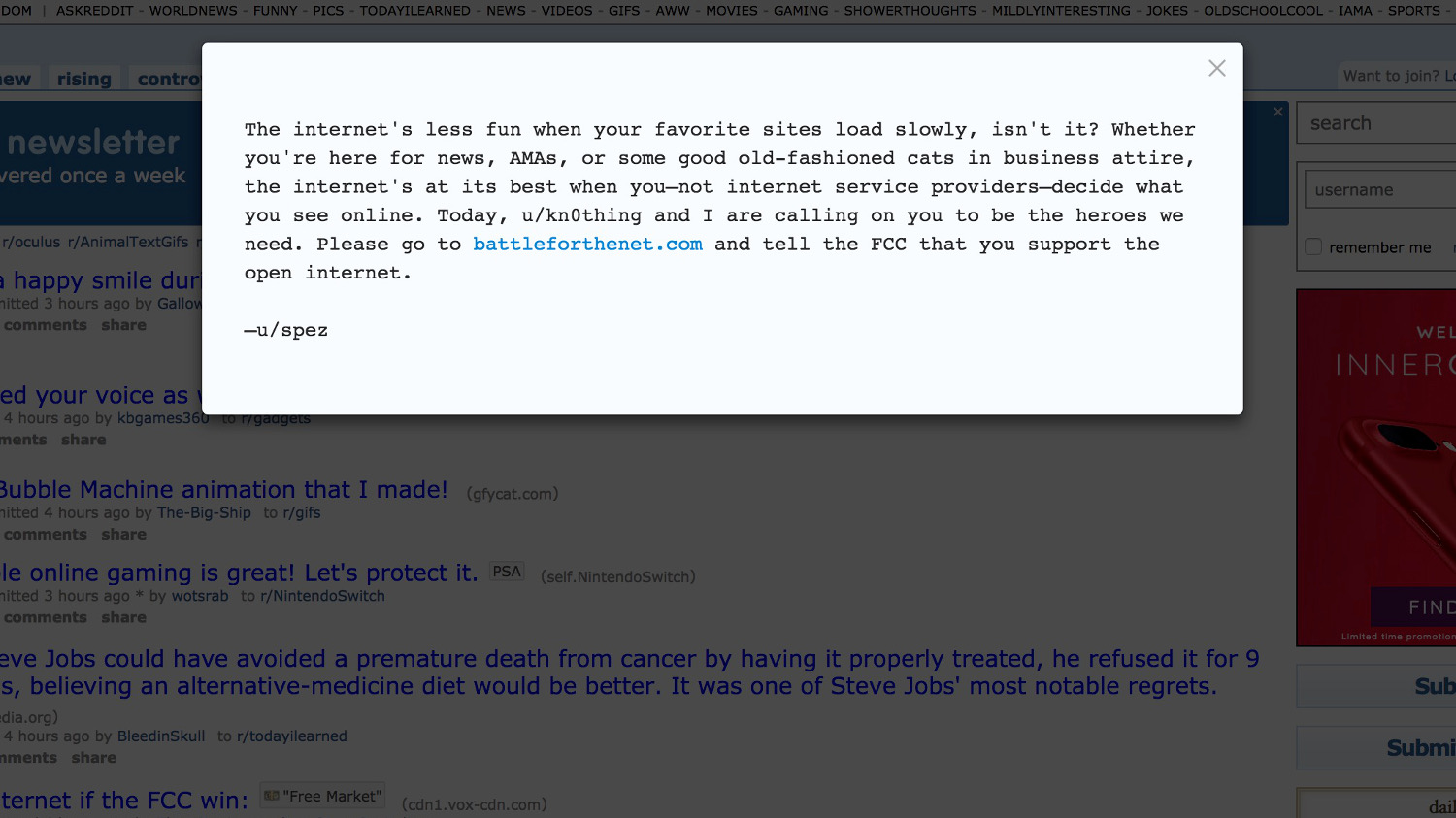
Reddit’s approach on the Day of Action is a little more ingenious.
When you head to Reddit today, you’ll see a pop-up message that appears to load slowly, and reads “the internet’s less fun when it loads slowly, isn’t it?” Not only that, but the Reddit logo is also animated so it looks like it’s loading slowly.
The point here is to demonstrate what throttled internet speeds could look for users like if net neutrality protections are rolled back.

Google’s protest against the rollback of net neutrality laws comes in the form of a statement, which reads in part the company hopes “you’ll make your voice heard.”
”Thanks in part to net neutrality, the open internet has grown to become an unrivaled source of choice, competition, innovation, free expression, and opportunity. And it should stay that way,” Google writes.
The search and technology giant stopped short of any prominent pop-up, banner or throttled speeds on google.com, but it’s position on the matter of net neutrality is clear.
Amazon
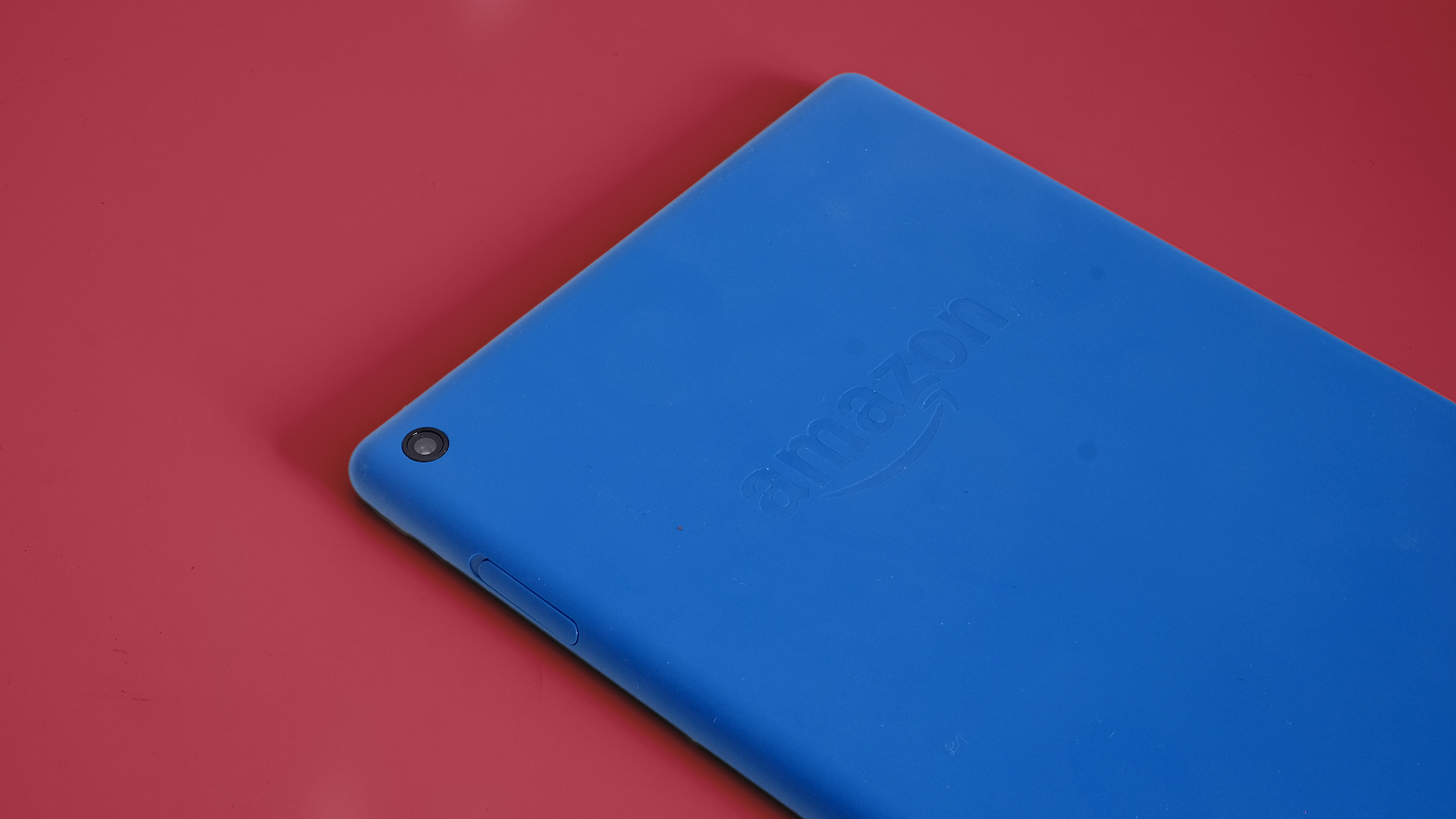
Amazon’s protest is a more hidden than some others. When you head to the Amazon home page and scroll down a ways, you’ll notice a small section to the right that reads “Net Neutrality? Learn More.”
Click here, and you’re taken to the Internet Association’s page, which reads prominently: "Save The Open Internet". There's also this helpful explainer video on the page:

Twitter also posted a blog post today protesting the rules rollback, arguing net neutrality is extremely important in maintaining competition and in reaching global customers.
It also noted that you currently “don’t have to be a big shot to compete” - a reality that could change for smaller companies if net neutrality laws are rolled back. Twitter's PublicPolicy arm is promoting Net Neutrality Day with a special #NetNeutrality hashtag.
Netflix
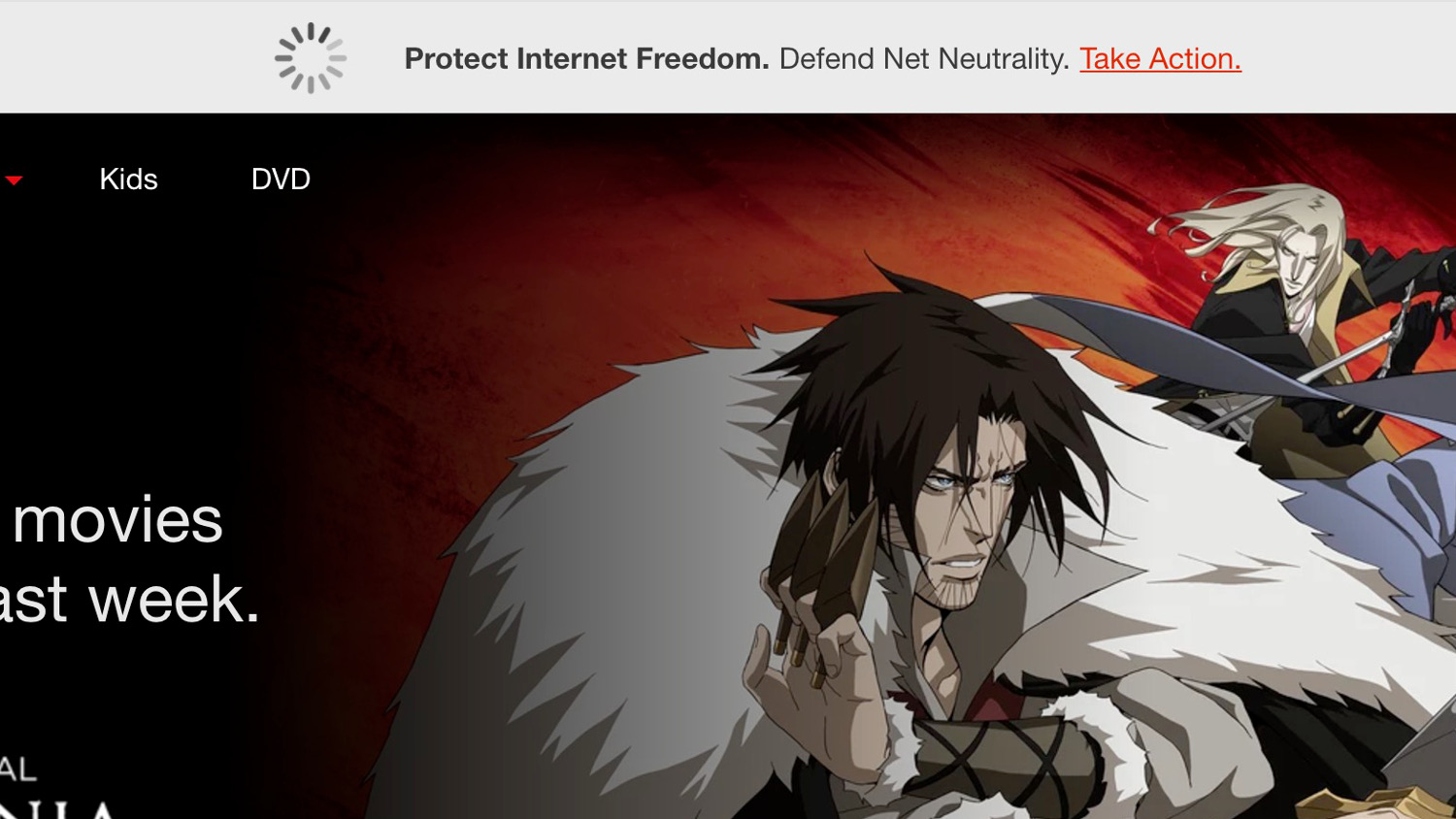
Netflix’s protest is slightly more in-your-face than a staid blog post. When you head to Netflix today, you’ll see a banner that reads “Protect Internet Freedom. Defend Net Neutrality,” along with a prompt to “Take Action.” Clicking on this will take you to the Internet Association’s page on net neutrality.
Mozilla
Mozilla has long supported net neutrality, and in celebration of today’s event the company posted a nine-hour long video of narrators reading pro-net neutrality comments written to the FCC. It’s a slightly different protest, and a little bizarre, but it certainly sends a message.
Electronic Frontier Foundation
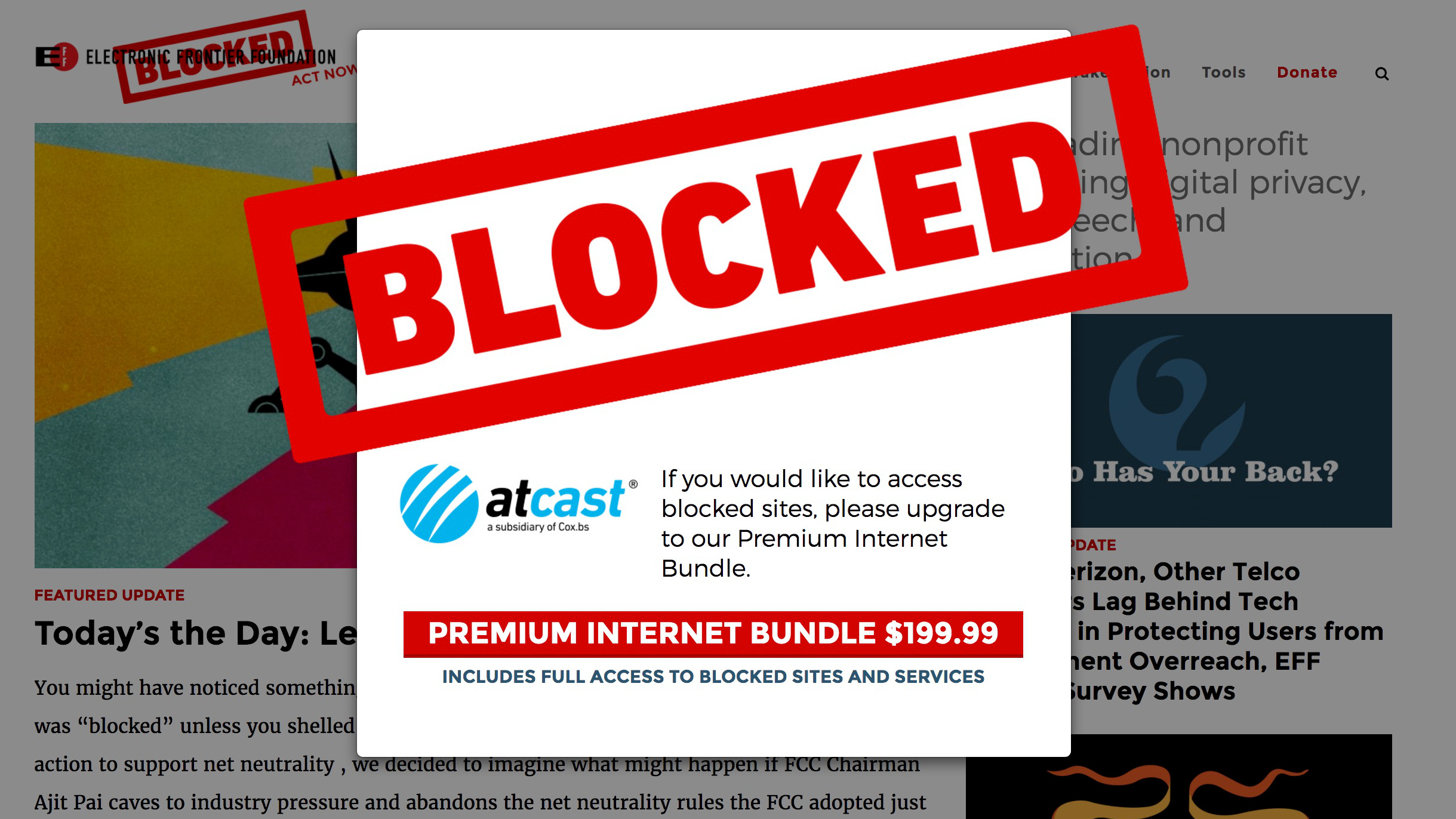
The Electronic Frontier Foundation (EFF), known for defending the rights of people in their digital lives, today posted a fake message from “Atcast” telling users they had to pay extra for the “premium bundle” in order to access the website.
Of course, another pop-up then explained the first message is fake, but this demonstrates what could actually happen without net neutrality protections.
Why does this matter for you?
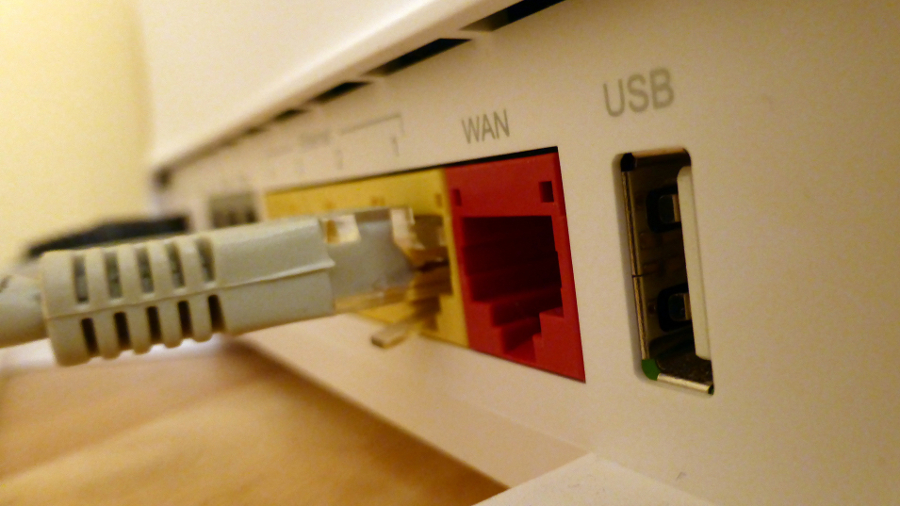
Net neutrality is an increasingly important issue, and one that could eventually affect everyone who uses the internet.
Without net neutrality, ISPs such as Comcast and Charter could throttle your internet access depending on the websites you use.
So, for example, while you might pay $40 per month for a basic internet package, you may then have to pay an extra $5 just to use Facebook or Twitter. Or, you might have to pay extra to get a certain speed, depending on the websites you access.
That’s not good new for users, obviously, but it means mega-giant ISPs could stand to make a lot of money at the expense of keeping access to the internet unrestricted.
What can you do about all this? For starters, head to the Internet Association’s website and click the button to “tell the FCC to keep net neutrality.” You can send your comments to the FCC to let the commissioners know you want the internet to remain open.
- Stay protected: Here are this week's best VPN deals
Christian is a writer who's covered technology for many years, for sites including Tom's Guide, Android Central, iMore, CNN, Business Insider and BGR, as well as TechRadar.